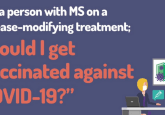Taking control and becoming empowered: the MS expert patient

The term ‘expert patient’ has been around for approximately 20 years. Its first appearance was in a report presented in 1999 to Parliament in the UK as an initiative for helping people to manage chronic illness [1]. In this context, expert patients are people living with chronic conditions who can take greater control of their health through understanding and managing their illnesses, which can lead to better quality of life [2].
In 2004, the BMJ published an article titled “Expert Patient – dream or nightmare?” looking at the way the medical profession viewed the development of these expert patients [3]. There was as much antipathy towards this change in the patient landscape as there was support for it. We have come a long way since then – the growth of the internet and increased access to information has meant that patients can become more informed than ever before and the opportunity to become an expert patient has increased. So why should patients become experts in their conditions? How are they able to and what challenges might there be? What value can the expert patient bring to the healthcare conversation?
Why should people with MS become expert patients?
Particularly within my own disease area, multiple sclerosis (MS), I believe patients have a vested interest in becoming experts so that they can self-manage between clinic appointments and access the most suitable services. This is even more important now because the COVID-19 pandemic has had a big impact on MS services. In the UK, an MS Register survey revealed that in June 2020, 32% of people with MS had their appointments cancelled or delayed [4]; while an MS Society (London, UK) and MS Trust (Hertfordshire, UK) survey of healthcare professionals, also in June 2020, revealed that 55% of respondents’ MS services were below pre-COVID capacity and 70% did not believe their MS service was able to meet the needs of people living with the condition compared with before the pandemic [5].
There is also an increasing range of treatment choices available for people living with MS. When I was diagnosed in 2008, the choice was limited to just five disease-modifying drugs. That has now more than doubled [6] and in many cases the newer treatments come with potentially more serious side effects [7]. It is important that patients can understand the risks versus benefits when making decisions about their healthcare and that they are able to cope with the ongoing decisions they need to make about managing not only their drug treatment but also other interventions and care. Decision-making aids, such as the MS Decisions tool [8], can become more valuable if the person using it is already informed.
There has also been a marked shift generally in healthcare away from the paternalistic model, where “doctor knows best,” to one of shared decision making. The NHS’s Long-Term Plan aims for up to 2.5 million people to benefit from personalized care by 2024, offering them the same control and choice over their health “as they have come to expect in every other aspect of their life” [9]. Shared decision making is a key component for this [10] and becoming an expert patient can facilitate the process, as it can give patients the confidence to play an active role in their healthcare.
How does someone become an expert patient?
Becoming an expert patient is not without its challenges. It takes a great deal of time, effort and knowing where to look for good-quality information and resources. It also depends on how ‘expert’ a patient wants to become and how involved in the healthcare system and in decision making they want to be.
The NHS offers information on health coaching, peer support and education as ways of supporting self-management [11]. There are also courses available to help people with certain conditions to self-manage generally or self-manage specific symptoms. In MS, for example, talkHealth runs an online patient and carer support program [12], while the MS Society runs fatigue-management courses [13]. For individuals wanting to be more heavily involved in the research and development process for medicines, EUPATI offers training in a patient-led partnership that works across stakeholders.
Symptom-tracking apps are also helping patients to take a more active role in their MS and become more expert in their condition. Digital health is giving patients greater control over health data but to understand it, they need to have a degree of expertise. We need to ensure that everyone is able to access digital tools and they have the know-how to use these apps effectively, not just patients but doctors too.
The move towards making scientific and medical information open access and more suitable for a lay audience is also helping the development of the expert patient. It means that patients are now able to see much of the information that their doctors are seeing, at the same time and in a format that is understandable to them. The European Union Clinical Trials Regulation 536/2014 includes a requirement that lay summaries will have to be submitted as part of clinical trial results reporting and many companies are producing them already. In addition, one of my regular go-to places for in-depth but understandable MS research is the Barts-MS research blog [14]. It is run by the MS team at Bart’s (London, UK) and brings research papers to a lay audience with the team’s own thoughts and commentary. It is a two-way dialogue because readers have the opportunity to leave comments and ask questions. We must remember though that not everyone is health literate, has English as their first language or may be able to easily process such information because of cognition or memory issues. How can we help them to also become expert patients?
There is also a move towards providing more lay information at conferences and congresses. Some of them now even have their own patient tracks, such as the European Society of Medical Oncology and the European League Against Rheumatism. Plus, with a move online due to COVID-19, access to these congresses is being opened and they are becoming more accessible to patients who want to learn about their disease area. To keep this avenue open as a way of educating the expert patient, we need to ensure free access.
Is there value in being an expert patient?
There is evidence that suggests a general correlation between self-management and a positive impact on health services. It can change how and when people are using health services and the subsequent healthcare costs [15,16]. Being an expert patient has transformed my life with MS. One of the hardest things I found to come to terms with when I was diagnosed was the unpredictability of the condition. I have always been a planner. I organize everything. Not knowing when my next relapse could be, what part of the body it might affect or how long it might last was the single most difficult thing for me to handle in the long-term management of my condition. Becoming an expert patient has helped me to feel more empowered and in control of the situation. It has helped me to recognize when and who I should be contacting about my condition and how I can play an active role in improving my MS care in the future. It has also helped me to educate those around me, which in turn helps them to offer me better support. Not everyone will want to become an expert patient but for me it was the right thing to do. What we need to make sure is that support and tools are available to all patients who want to pursue this path and make it easier for them to be empowered throughout the process.
Disclaimer
The opinions expressed in this editorial are those of the author and do not necessarily reflect the views of Neuro Central or Future Science Group.
[1] Cordier J-F. The expert patient: towards a novel definition. Eur. Respir. J. 44, 853–857 (2020).
[2] Patient.info. Expert patients.
https://patient.info/doctor/expert-patients#ref-2
[Accessed 22 August 2020]
[3] Shaw J, Baker M. “Expert patient” – dream or nightmare? BMJ 328, 723 (2004).
[4] MS Society. Living with MS during the coronavirus pandemic.
www.mssociety.org.uk/get-involved/campaign-with-us/campaigns-blog/living-with-ms-during-the-pandemic
[Accessed 22 August 2020]
[5] MS Society. Findings of a survey of MS healthcare professionals on the impact of COVID-19 on MS services in the UK.
www.mssociety.org.uk/what-we-do/our-work/our-evidence/ms-in-the-uk#covid
[Accessed 22 August 2020]
[6] MS Society. Disease-modifying therapies.
www.mssociety.org.uk/about-ms/treatments-and-therapies/disease-modifying-therapies
[Accessed 22 August 2020]
[7] Girouard N, Soucy N. Patient considerations in the management of multiple sclerosis: development and clinical utility of oral agents. Patient. Prefer. Adherence 5, 101–108 (2011).
[8] Multiple Sclerosis Trust. MS Decisions aid.
www.mstrust.org.uk/about-ms/ms-treatments/ms-decisions-aid
[Accessed 22 August 2020]
[9] NHS England. Universal personalized care.
www.england.nhs.uk/personalisedcare/upc/comprehensive-model/
[Accessed 22 August 2020]
[10] NHS England. Shared decision making.
www.england.nhs.uk/shared-decision-making
[Accessed 22 August 2020]
[11] NHS England. Supported self-management approaches.
www.england.nhs.uk/personalisedcare/supported-self-management/approaches/
[Accessed 22 August 2020]
[12] talkHealth. Support programs.
www.talkhealthpartnership.com/support/myMS
[Accessed 22 August 2020]
[13] MS Society. Online fatigue-management course.
www.mssociety.org.uk/about-ms/signs-and-symptoms/fatigue/managing-fatigue/online-fatigue-management-course
[Accessed 22 August 2020]
[14] Barts-MS. Multiple sclerosis research.
https://multiple-sclerosis-research.org/
[Accessed 22 August 2020]
[15] The Health Foundation. Evidence: helping people help themselves.
www.health.org.uk/publications/evidence-helping-people-help-themselves
[Accessed 22 August 2020]
[16] The Health Foundation. Reducing emergency admissions.
https://reader.health.org.uk/reducing-emergency-admissions/key-points
[Accessed 22 August 2020]
You might also like:



